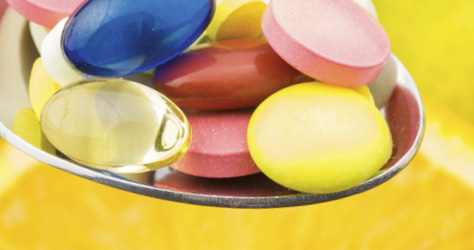Boosting your nutrition
Although eating a balanced and healthy diet (lots of fruit and veggies, protein packed meals and go easy on the sweet stuff!) will help you get all the vitamins and minerals you need during pregnancy, there are some that are recommended as a supplement for expectant mums.
At a glance
- Folic acid is a huge benefit to your developing baby
- Vitamin D can be found in oily fish, eggs and meat
- A balanced and healthy diet will help you get the vitamins and minerals you need

Folic Acid
If you are trying to conceive at the moment, you should take 400 micrograms of folic acid, and continue to take it until you reach your 13th week of pregnancy. Folic acid can be of huge benefit to your developing baby as it can help prevent birth defects such as spina bifida. If you have just found out you are pregnant, start taking it now until you are 13 weeks.
You may need to take a higher dose of folic acid (5mg) if you have a family history of spina bifida and neural tube defects, if you have diabetes, or are on medication for epilepsy or have a high BMI. As this is a higher dose than the usual pregnancy dose, it needs to be prescribed by a doctor as it is very difficult to ever get enough from diet alone. But do also look out for foods which are rich in folate (as well as taking the supplements). These include brown rice and green leafy veg, as well as some fortified cereals.
Vitamin D
Vitamin D is really important in pregnancy and for breastfeeding mums too, as it regulates the calcium and phosphate in your body which keep your teeth and bones strong. The NHS currently advises all mum-to-be and those still breastfeeding their babies to take 10 micrograms of vitamin D each day. Vitamin D can also be found in oily fish, eggs and meat, so making sure your diet is rich in those foods, and taking a supplement will give you maximum protection.
Iron
Your midwife or GP might also suggest iron tablets if your blood tests have shown your levels are low – an iron rich diet can help prevent this. Green leafy veg (again!) is a top source of iron, as are dried fruit and nuts.
Other supplements
Your midwife or GP can give you specific advice on any supplements or additional vitamins you may need during your pregnancy. You could also talk to them about the advantages of taking any of the over-the-counter multivitamins specifically designed for mums-to-be, too. But it's important to be aware that there is no advantage in taking other vitamin and mineral supplements apart from folic acid and vitamin D unless your GP prescribes them. Do not take vitamin A supplements or any supplements containing Vitamin A, as too much could be harmful to your baby.